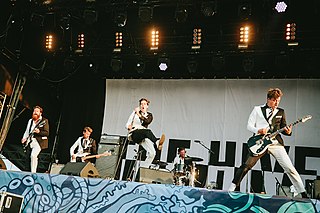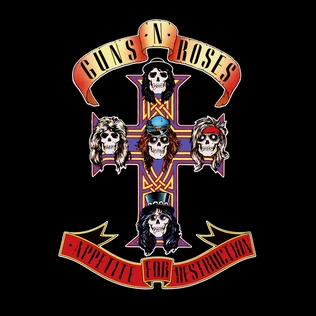Madness or The Madness may refer to:

The Hives are a Swedish rock band formed in Fagersta in 1993. After gaining traction in Sweden through the 1990s, they rose to worldwide prominence in the early 2000s during the garage rock revival. The band's line-up—consisting of Howlin' Pelle Almqvist (vocals), Nicholaus Arson, Vigilante Carlstroem, Dr. Matt Destruction (bass), and Chris Dangerous (drums)—remained unchanged from 1993 until 2013, when Matt Destruction retired for health reasons and was replaced by The Johan and Only.

Appetite for Destruction is the debut studio album by American hard rock band Guns N' Roses, released by Geffen Records on July 21, 1987. It initially received little mainstream attention, and it was not until the following year that Appetite for Destruction became a commercial success, after the band had toured and received significant airplay with the singles "Welcome to the Jungle", "Paradise City", and "Sweet Child o' Mine". The album went on to peak at number one on the US Billboard 200, and it became the seventh best-selling album of all time in the United States, as well as the best-selling debut album in the country. With over 30 million copies sold worldwide, it is also one of the best-selling albums globally.
Rule or ruling may refer to:
A hive mind or group mind may refer to:
A technical knockout (TKO) is a professional fighting term.

Steven Adler is an American musician. He is the former drummer and co-songwriter of the hard rock band Guns N' Roses, with whom he achieved worldwide success in the late 1980s.
Taxi Driver is a 1976 Martin Scorsese film.
Discipline is any training intended to produce a specific character or pattern of behaviour.
Suicide is the act of intentionally ending one's own life.
Survival is the act of surviving; to stay living

Resentment is a complex, multilayered emotion that has been described as a mixture of disappointment, disgust and anger. Other psychologists consider it a mood or as a secondary emotion that can be elicited in the face of insult or injury.
Emotion, in psychology and common use, refers to the complex reaction of an organism to significant objects or events, with subjective, behavioral, physiological elements.
Destruction may refer to:

Self-destructive behavior is any behavior that is harmful or potentially harmful towards the person who engages in the behavior.
Help is a word meaning to give aid or signal distress.

Lawrence "Kris" Parker, better known by his stage names KRS-One and Teacha, is an American rapper from The Bronx. He rose to prominence as part of the hip hop group Boogie Down Productions, which he formed with DJ Scott La Rock in the mid-1980s. KRS-One is known for his songs "Sound of da Police", "Love's Gonna Get'cha ", and "My Philosophy". Boogie Down Productions received numerous awards and critical acclaim in their early years. Following the release of the group's debut album, Criminal Minded, fellow artist Scott La Rock was shot and killed, but KRS-One continued the group, effectively as a solo project. He began releasing records under his own name in 1993. He is politically active, having started the Stop the Violence Movement after La Rock's death. He is also a vegan activist, expressed in songs such as "Beef". He is widely considered an influence on many hip-hop artists.

Boglárka Csemer, professionally known as Boggie, is a Hungarian pop vocalist and songwriter. Globally, Boggie is best known for her 2014 hit single entitled "Nouveau Parfum" from her self-titled debut studio album Boggie (2013). While the song went number one on Hungary's MAHASZ chart, it also found its way to two Billboard charts reaching number three on its Jazz Album Chart and number 17 on its World Music Album Chart. She represented Hungary in the Eurovision Song Contest 2015 with the song "Wars for Nothing". On 19 May 2015, her song qualified for the 2015 Eurovision Song Contest final, which was held on 23 May 2015 in Vienna, Austria.

"Days of Self Destruction" is a song by American rock band CKY. Written and produced by the band's vocalist and guitarist Chad I Ginsburg, it features additional guitar by Mastodon's Brent Hinds. The track is featured on the band's 2017 fifth studio album The Phoenix, and was released as the first single from the album on May 1, 2017. "Days of Self Destruction" is the first song released by CKY since its return in 2016 following the 2011 departure of original frontman Deron Miller.
This page is based on this
Wikipedia article Text is available under the
CC BY-SA 4.0 license; additional terms may apply.
Images, videos and audio are available under their respective licenses.







